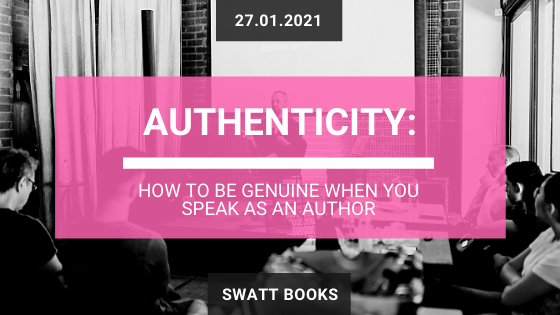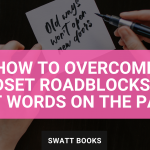One of the most effective ways for an author to market themselves and their books is through public speaking. The catch is that many authors are natural introverts; they prefer to write as opposed to present, which makes capitalizing on the benefits of public speaking very difficult.
As this is such a common stumbling block for many authors, I have asked international speaking coach Deon Newbronner from Truth.Works to give you some insight and advice on how to be genuine when you present to an audience.
You have the power to choose what your audience sees in you when you present.
Critical to your success as a presenter is recognising that your audience will be judging you from the moment you go live. They cannot help it and they do not consciously know they are doing it but judging you they are.
An obvious question might be “what judgements are they making?” We judge others based on their observable behaviours. You audience are judging you based on what they see you do.
Much like your book. Don’t we judge a book by its cover?
As a presenter, your behaviours are driven by: your values – those things you hold as being important; your ego and wider personality; and your beliefs, fears and aspirations. It’s a complex mix.
In my work with authors all over the world who want to improve their impact and influence on the audiences they present to, many ask how can I be genuine when I have to toe a certain line? When I am expected to be a certain way? My first piece of advice, and often the most important and impactful, is to be authentic when you present.
Authenticity is about being genuine and, in the context of presenting, it is about being a version of yourself that is connected to your book when you present rather than being something you think you’re not.
What is it to be authentic as a presenter?
If you focus on trying to manage the impression an audience has of you when you present you are more likely to come across as insincere. It is important to recognise that being yourself when you present might require work on building your confidence in that situation, but confidence is a necessary state to be in if you are to be seen by the audience as both positively impactful and authentic.
The word authentic comes from the Greek word ‘authentikos’ which means ‘genuine’. When you present, it is important to know what you stand for. Your book has a message. You have spent months choosing the right words. Your book says something about who you are. So, when you present your belief and knowledge must come through in your words and actions.
How do I be authentic as a presenter?
As no change is possible without first having self-awareness, a useful thing to do is to reflect on what it is that you do stand for as an individual (including your values), as an author and as a presenter. Having considered these things consciously, ask yourself these two specific questions:
- Does the way that I present communicate the things that I believe and feel and that I want others to feel?
- What do I need to do if it does not?
These questions provide a link between knowing what you stand for (what is ‘authentic’ for you) and how you can demonstrate authenticity.
A lot of research has been carried out into what influences audiences positively, how to make an impactful start, how to structure information to engage and how to maximise the chance of an audience taking action through a strong finish.
All of these techniques and approaches are absolutely aligned with you being authentic as long as what you are presenting and asking of an audience is in keeping with your strongly held beliefs and values. You core message. If this alignment is in place then it is much more likely that any approaches you utilise will be effective. Building your confidence as an authentic presenter.
Five practical steps to be authentic as a presenter
Here are my 5 steps to building your confidence being an authentic presenter:
- Our values drive our behaviours, thinking and feeling. Work out what these are. Know them, link them to your book’s key messages, and use them as your anchor when presenting.
- Set an intent – a clear motivating reason (for yourself) for presenting. Hold true to this throughout your presentation. The intent you choose must be one of your values, relevant to the presentation, your book and the audience.
- Be very clear on your desired outcome and call to action: what, specifically, do you want the audience to know or do as a result of your presentation?
- Manage your state to be as confident as possible: be aware of how you feel before a presentation and take steps to build your situational confidence. Some of this can be done in advance through effective preparation and mental rehearsal. In other words Pause, Breathe and Observe.
- Take time to structure the content to ensure the audience has all of the key information presented clearly. Not doing this will be an interference for them.
In summary, all presenters can be seen as being authentic when they present. Often, success is down to how much self-awareness you have about what you stand for and how your audience might be perceiving you. This is so that you can be flexible enough with your behaviors to proactively manage their perceptions until this all becomes completely natural and unconscious.
It is important to recognise that all presenters are improving, providing they focus on raising their self-awareness. By focusing on the issue of authenticity you are getting to the very heart of what it is to be a great presenter.
You have chosen what your audience reads about you in your book. You are also choosing what your audience sees in you when you present.
Truth.Works. online Compelling Speaker course will help you be authentic as a presenter. ENROL NOW!





